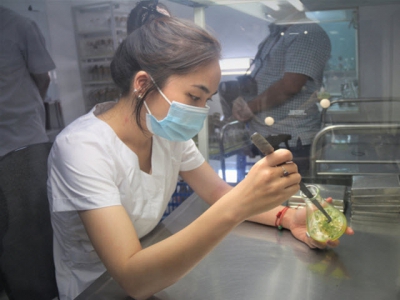Research and transfer new varieties of seeds as the key element of the forestry sector

New varieties of seeds put in production have brought the yield of planted forests from less than 10m3/ha/year in the period before 2000-2010 to 15-20m3/ha/year in the period 2015-2020
Variety plays a decisive role in the yield and quality of crops in the forestry sector. Photo: Pham Hieu.
Research and create new varieties
In agricultural and forestry production in general, varieties play a very critical role in determining the yield and quality of crops. In the forestry sector in particular, variety plays an even more important role because technical measures such as fertilization and watering has limited impact.
Fast-growing trees such as acacia, eucalyptus, and pine are an important part of the current forest planting structure. As a major source of timber, the area of these trees will reach about 2.7 million hectares by 2018, accounting for about 65-70% of the total planted forest area of the country.
For many years, attention has been paid to research on these species. New varieties have been recognized and put in production, so the productivity of planted forests has improved significantly, from less than 10m3/ha/year in the period before 2000 - 2010 to 15-20m3/ha/year in the period 2015-2020.
The Forest Tree Improvement and Biotechnology Research Institute has focused on breeding key fast-growing tree species. In addition to the selection of varieties according to growth criteria, properties related to furniture production such as density, shrinkage, static flexural strength, have aslo been paid attention to. In addition, research on resistance to pests and diseases and adverse environmental conditions has also been promoted.
Transferring of seeds and culture method
The Forest Tree Improvement and Biotechnology Research Institute has selected and recognized 80 varieties of acacia, eucalyptus and macadamia species. Besides, the Institute has built more than 60 hectares of acacia and eucalyptus seed orchards in many ecological regions across the country.
From 2010 to the present, the Forest Tree Improvement and Biotechnology Research Institute has transferred seeds and tissue culture method for 14 hatcheries across the country. The transfer is carried out in a full package, including the provision of original seedlings and training at the Institute and at the production facility.
With the efforts of the Institute and production facilities, training classes have been carried out successfully. After being trained, they have mastered the technology and carried out seed production in large scale.
Regarding seed production, in the period 2010 - 2020, the Institute has produced and provided more than 4,300 original seedlings and more than 1 million original seedlings of recognized varieties of acacia and eucalyptus, thereby contributing to the production of more than 85 million tissue seedlings and 150 million cutting seedlings.
Mr. Nguyen Duc Kien, Director of the Forest Tree Improvement and Biotechnology Research Institute proposed to the Ministry of Agriculture and Rural Development the project "Developing forest tree varieties for economic afforestation."
Deputy Minister of Agriculture and Rural Development Le Quoc Doanh: “the Forestry sector is full of potential, not only economically, but also socially and environmentally. Currently, the demand for production of planted forests is very high, with 420 million trees/year. Therefore, it needs to be well organized, promoting the economy and people's lives, especially those in the midland and mountainous areas who are attached to the forest profession.
Có thể bạn quan tâm
 Fruit specialties in the South-western region
Fruit specialties in the South-western region New varieties of seeds put in production have brought the yield of planted forests from less than 10m3/ha/year in the period before 2000-2010 to 15-20m3/ha/year
 An Giang to quadruple area planting vegetables, fruit trees in next decade
An Giang to quadruple area planting vegetables, fruit trees in next decade The Mekong Delta province of An Giang has set a target to quadruple the area planting vegetables and fruit trees in the next decade compared to the current area
 Deep processing creates high-value agricultural products
Deep processing creates high-value agricultural products Deep processing of agricultural products have helped farmers of the countries where do not have favourable conditions for agricultural production such as Japan